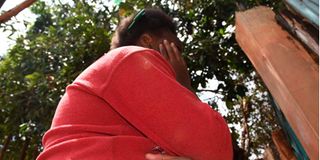The power of one: How Lanoi’s courage sparked community change in war on GBV

Women in Narok County like Lanoi*, face the harsh realities of GBV in a region where harmful practices like FGM, early marriages, and polygamy continue to hold sway.
What you need to know:
- Lanoi, a 29-year-old mother of three, escaped an abusive marriage after her husband tried to marry off their 13-year-old daughter.
- Now an active member of Tasaru Ntomonok Initiative, she helps other women escape GBV in Narok County.
- Her courage has made her a role model for young girls like 16-year-old Leah, who sees in Lanoi the strength to shape her own future.
In a small village nestled at the foot of the Mau Escarpment in Narok County, a quiet revolution is taking place. Here, where cultural practices like female genital mutilation (FGM), early marriages, and polygamy have long dictated women's lives, a group of determined women is changing the narrative—challenging norms and empowering others to break free from cycles of abuse.
Twenty-nine-year-old Lanoi*, a mother of three, knows this struggle intimately. For years, she endured abuse at the hands of her husband, trapped in a relationship where her autonomy was systematically stripped away.
"He believed that because I was his wife, he had the right to control everything about me—my body, my choices, my future," Lanoi shares, her voice steady despite the painful memories.
In Narok, Lanoi's story is not unusual. Many women find themselves trapped in toxic relationships, unable to escape due to economic dependence, fear, or cultural expectations. For her, the turning point came when her husband attempted to marry off their 13-year-old daughter to an older man.
"That was the moment I decided enough was enough. I couldn't let my daughter suffer the same fate as me," she recalls.
With support from local organisations that assist GBV survivors, Lanoi found the courage to seek legal recourse.
Her case was highlighted during a recent forum in Narok, where stakeholders gathered to discuss strategies to combat gender-based violence (GBV). Though her fight for justice was arduous, the backing of community leaders and non-governmental organisations helped her regain control of her life.
"Education is key," emphasises Pauline Naikuni, Narok Gender Officer, who has been at the forefront of advocating for women's rights.
"Women like Lanoi are the reason we do this work. They are living proof that change is possible, but it requires collective effort from the community and the government."
Today, Lanoi has transformed her painful experience into purpose. She is an active member of Tasaru Ntomonok Initiative (TSI), a local women's group that provides crucial support to GBV survivors. The group meets regularly, creating a space where women share their experiences, learn about their rights, and offer emotional and financial support to one another.
Through her work with TSI, Lanoi has become a passionate advocate for girls' education and women's empowerment in her community.
"I want every woman and girl in Narok to know that they have a voice," she says with conviction. "We do not have to accept abuse; we can rise above it."
This sentiment resonates with Ramadhan Shaban, a youth leader working closely with community elders and young people to raise awareness about GBV. He understands the complexities of navigating cultural expectations while advocating for change.
"It's not enough to just speak out against GBV," Shaban explains. "We need to change the mind-set of our community, especially the men and the youth. It's important that both genders are involved in this fight."
Shaban's efforts are part of a broader movement in Narok County to end the cycle of violence against women. He and other community leaders focus on educating young people, helping them understand that respect for women and girls is fundamental and non-negotiable.
Despite the entrenched challenges, there are encouraging signs of progress. The Gender Violence Recovery Centre in Nairobi, a key partner in this movement, reports that more survivors in Narok are coming forward to seek support and legal redress—an indication that women are beginning to break the silence that has historically surrounded gender-based violence.
Lanoi's courage and transformation have made her a role model, particularly for young girls in her community who are now able to envision different possibilities for their futures.
"I want to be like Lanoi when I grow up," says 16-year-old Leah, a student at a local secondary school. "She shows me that I can be strong and that my voice matters."
Through their collective efforts, these women are rewriting their narratives—stories no longer defined by suffering but illuminated by resilience, empowerment and hope. They are creating a new future where daughters will inherit strength rather than fear.
For Lanoi, this journey continues. Her story stands as testimony to the power of perseverance and the strength of a woman determined to create change not just for herself, but for generations to come.
"The road has been long, but now I know that my daughter will never have to go through what I did," she says, her gaze fixed on the horizon, where new possibilities await.
*Name changed to protect privacy.


